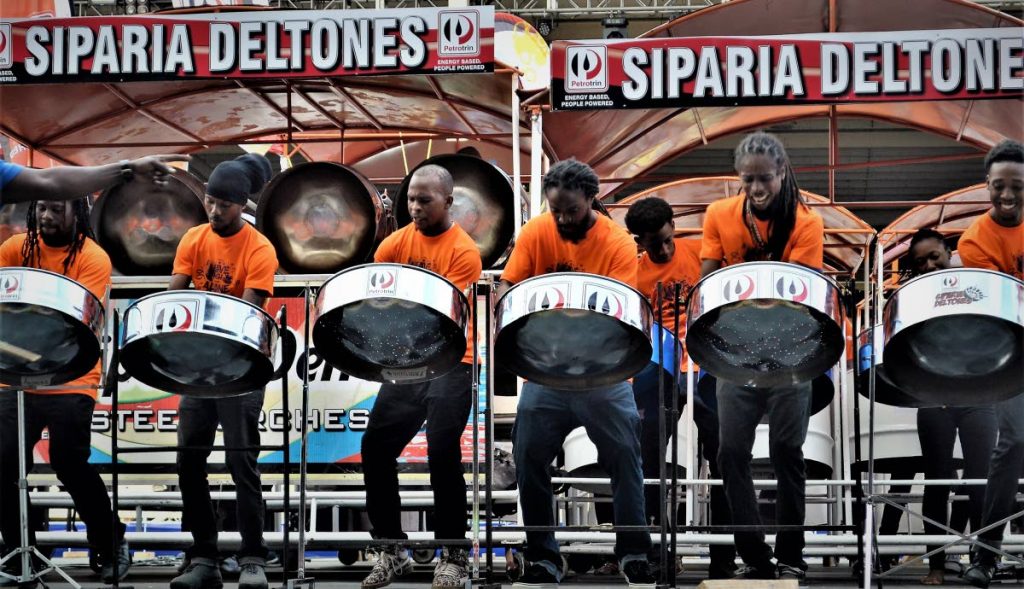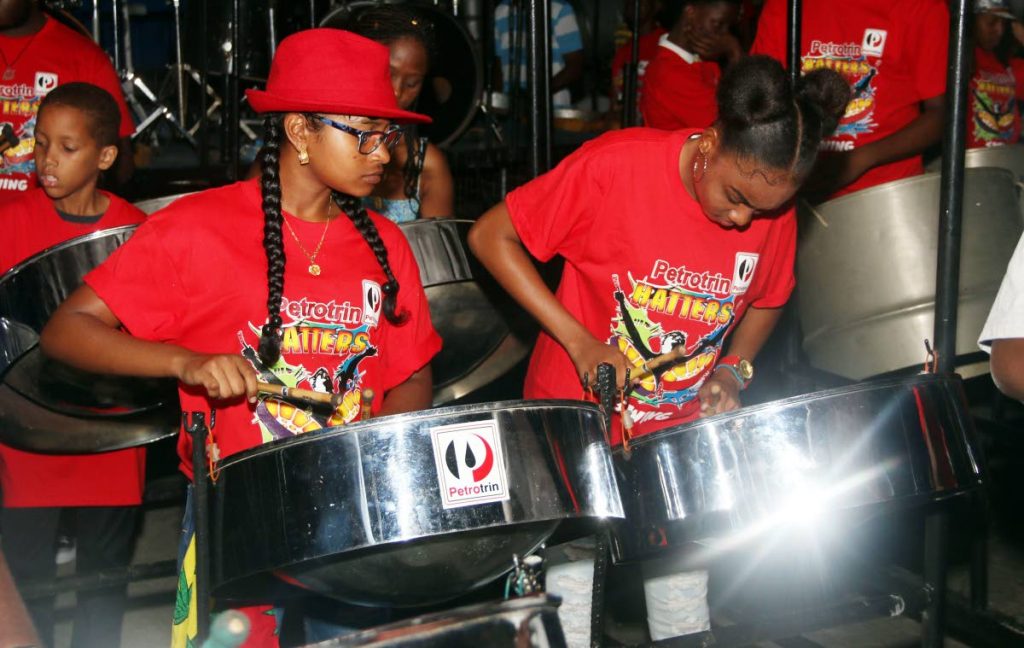Where pan reach?

The oil industry, which gave rise to the steelpan embraced by TT as its national instrument, may very well be its death knell as the decades-long sponsorship of bands by the last state oil company, Petrotrin, has dried up.
Less than two months after the closure of debt-riddled Petrotrin, the fallout for the cultural sector is beginning to be felt, as its successor, the Trinidad Petroleum group, will no longer sponsor three major steelbands – Hatters and Siparia Deltones out of south Trinidad, and Tobago's Katzenjammers – as well as more than 20 community-based bands.
The tradition of state oil sponsorship of the steelpan dates back to the 1960s, when Texaco began the trend of providing large contributions to the pan fraternity, which successor companies, including Petrotrin, embraced. That convention has ended as Petrotrin, with a $13 billion debt and annual losses to the tune of $2 billion, closed on November 30, 2018.
With a reduced allocation from $30 million to $20 million for Pan Trinbago from the Government to run Panorama and businesses not willing to part with scarce resources, the fraternity is facing another setback. Wilfred Espinet is making it clear that Heritage Petroleum Co Ltd, which he chairs, will not be the "benevolent mother" to pan as Petrotrin was. Heritage, Paria Fuel Trading Co and Guaracara Refining Co fall under Trinidad Petroleum and were created to maintain the core business of oil, fuel imports, and the refinery assets.
None of these companies can afford the level of financial sponsorship of steelbands as in the past, Espinet told Business Day.
Over the years, Petrotrin has spent tens of millions of dollars on steelbands but that cannot continue, especially as Heritage seeks to become a viable entity while borrowing to service Petrotrin's debt. As such, no band will be flying Heritage or Paria flags, nor carrying their titles, he said.
“We cannot tell our financiers we want to borrow money to give to institutions that are not going to be adding value to the process,” he said, especially now when the US stock exchange has changed dramatically that people are running away from risks.
Pan Trinbago president Beverly Ramsey-Moore, who manages Katzenjammers, has previously said Heritage promised to honour Petrotrin’s commitment to the steelband movement and hoped for a positive outcome, especially now that the pan body is facing challenging financial times.
Espinet said the ways in which the companies can continue to help will be discussed at a board meeting.
“We are trying to see what we can do (to assist pan). We will give some support, but it is going to be very limited. People either have to find a new vehicle or develop a new model to access funding.”
Up until 2018, Petrotrin provided full sponsorship to Hatters, Siparia Deltones and Katzenjammers. It also assisted more than 20 bands, especially those in fence-line communities, such as Jah Roots and Tornadoes in Point Fortin, La Brea Nightingales, Southern Marines from Marabella and reigning medium band champions for the last four years, Pan Elders of Carib Street, San Fernando. Petrotrin also engaged in a 15-year partnership with Phase II Pan Groove which ended in 2015. That band is now sponsored by Hadco.
Chairman of Pan Trinbago South Central Region Philip Barker said Petrotrin’s support for Hatters for 2018 was an estimated $200,000. The other bands chose not to share the financial contributions, but San Fernando Mayor Junia Regrello, CEO of CAL Skiffle, said it costs a large band about $500,000 to prepare for Panorama, from preliminaries to the semi-final and final stages.
Regrello said the transportation cost alone for bands from San Fernando to the Queen's Park Savannah, Port of Spain is $100,000 per trip. Pan tuners, arrangers, painting the pans, decorations, meals and uniforms are among some of the big cost items.
While appreciating the role the company had played in communities, Espinet said Petrotrin overreached itself.
"Petrotrin did a number of things that led it into a state where it became bankrupt. It undertook to do things that was outside of its core business. It was everything to everybody. We want to get out of that.”

He said as part of its corporate social responsibility, "Petrotrin had nuns living in houses. I had to maintain and put electricity, gas and water. I have given schools water, produced water for parts of south. We are still delivering water in some parts of south. We lost sight of the fact that Petrotrin was a company running on a model that had to be economically viable, earning incomes higher than its outflow. It was spending money in areas (other) companies did not spend money.”
“You know the reason Petrotrin sponsored steelbands had nothing to do with music. It had to do with the same reason it had to maintain playgrounds, because politicians go into a community and the steelband people say they want something, and they give it to them.”
Although Petrotrin formed relationships with the bands, so there were expectations, Espinet said, it created a situation whereby the sponsorship is absolute. "Nobody is generating in their own mind a method of finding funding otherwise. If culture is so critical to Trinidadians and Tobagonians we have to find a way to make them (nationals) support it.
“Why is it from the time we invented the steelband to now it isn’t able to operate as this divine instrument on its own. Guitars don’t have anybody giving them money. Chinese instruments do not get subsidies. A lot of other companies like Solo are no longer pan sponsors because fortunes of companies change. We have to be careful we are not creating victims out of everybody because they are given so much attention they don’t need to do anything because they are poor,” he said
Ramsey-Moore said proposals for Katzenjammers were submitted to Heritage and she expected a response soon.
“I am hoping that warmth and support Petrotrin gave would also come from Heritage," she said. Katzenjammers, a medium band finalist in the 2018, and a former winner of the category, should be able to manage preparations for the preliminary rounds.
"A percentage of our prize money is also invested, so in terms of start-up funding we would not have a problem. Going into the semi-finals and final, however, we are definitely going to need that support from Heritage or some other agencies,” she said.
Ramsey-Moore has indicated that Pan Trinbago cannot afford to pay the $1,000 stipend to steelband players for 2019 and 2020 but encouraged bands to still participate in the competition.
“I know it is painful for a pannist not to be paid, but the stark reality is that Pan Trinbago cannot afford it at this time.”
Ramsey-Moore called on the communities “to give something until Pan Trinbago can stand on its two feet again.”
Hatters manager David Balbosa said he has had no discussions with Heritage but the band has begun preparations for Panorama.
“To be honest, in these times we can’t be sure what will happen. Petrotrin treated us very good in the past. I don’t know the financial state of the new company for it to be able to assist us. Note I am saying assist, not sponsor. We did not spend all the money so we still have a little trickle from last year. If we don’t get support, we will have to scrunt and dig into our own pockets,” Balbosa said.
Akinola Sennon, of Deltones, said the band, made up of mainly young people, was in talks with Heritage and hoped for a positive outcome.


Comments
"Where pan reach?"